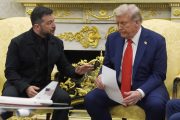
The members of the Eurasian Economic Union (EAEU) are working to set up a single gas market, which is likely to be established by 2025, Energy Minister of the Eurasian Economic Commission Arzybek Kozhoshev said in an interview with the Russian-based Sputnik news service.
“There are issues that should be resolved between our countries, we are currently in this process, there is an active phase of negotiations. There are several issues on which we cannot reach a common understanding, but I hope and believe that, by 2025, we should achieve a common energy market,” he said outside the Eurasian Forum in Sochi, Russia.
Kozhoshev also pointed out that members of the EAEU may start buying gas in rubles in the future. “We have not yet achieved that all five countries have switched to the ruble, but today this process is underway, and in the future, I think we will come to this,” he said.
In October, Kozhoshev revealed that all EAEU members except Kazakhstan had decided to use rubles for gas payments, elaborating that Astana may also begin trading in national currencies.
The EAEU is an economic alliance comprised of five former Soviet countries — Armenia, Belarus, Kazakhstan, Kyrgyzstan, and Russia — and was established purportedly to facilitate the free movement of goods, services, and labor among member states.
On May 24, Russian President Vladimir Putin attended the Eurasian Economic Forum (EEF) along with his Belarusian counterpart Alexander Lukashenko, President of Kazakhstan Kassym-Jomart Tokayev, President of Kyrgyzstan Sadyr Japarov, and Vice Prime Minister of Armenia Mher Grigoryan.
Addressing his audience at the EEF, Putin said:
We see really deep, fundamental changes taking place on the global stage. More and more states are taking a course towards strengthening national sovereignty, pursuing an independent domestic and foreign policy, and adhering to their own development model.
In March this year, the Kremlin unveiled its updated foreign policy doctrine positioning Russia as a unique country-civilization with an independent and multi-vector foreign policy motivated by its national interests. The document claimed that Russia regarded itself as responsible to ensure global and regional peace and security, and, though not deeming itself to be an archenemy of the West, highlighted Russia’s plans to protect its right to existence and freedom of development in light of hostile actions from the West.
According to the new doctrine:
The United States of America (USA) and their satellites used the measures taken by the Russian Federation as regards Ukraine to protect its vital interests as a pretext to aggravate the longstanding anti-Russian policy and unleashed a new type of hybrid war. It is aimed at weakening Russia in every possible way, including at undermining its constructive civilizational role, power, economic and technological capabilities, limiting its sovereignty in foreign and domestic policy, violating its territorial integrity. This Western policy has become comprehensive and is now enshrined at the doctrinal level. This was not the choice of the Russian Federation. Russia does not consider itself to be an enemy of the West, is not isolating itself from the West and has no hostile intentions with regard to it; Russia hopes that in future the states belonging to the Western community will realize that their policy of confrontation and hegemonic ambitions lack prospects, will take into account the complex realities of a multipolar world and will resume pragmatic cooperation with Russia being guided by the principles of sovereign equality and respect for each other’s interests. The Russian Federation is ready for dialogue and cooperation on such a basis.
The document also says that Russia plans to focus on “expanding mutually beneficial international cooperation” and is working toward a system of international relations that would guarantee security, its cultural and civilizational identity, and “equal opportunities” for the development of all states.
“Russian foreign policy realignment takes into account the Russian intelligence community and foreign policy community’s assessment of Russia’s enemies near and far,” observed Professor Joe Siracusa, a U.S. political specialist and dean of Global Futures from Curtin University. “It’s a realistic recalibration or adjustment to the world that’s in front of Russia, a very useful exercise because it incorporates the analysis, threat assessment and the intelligence (…) A couple of weeks ago, the Americans released their Annual Threat Assessment. They identified China as public enemy number one, and Russia as public enemy number two.”
On June 11, Kremlin spokesman Dmitry Peskov, referencing the new U.S.-British economic partnership that aims, among other things, to drive Russia out of the global nuclear energy market, remarked that Moscow is used to living in an environment in which America and Britain have been trying to contain Russia.
“The policy of containing our country is an absolute constant in the foreign policy of both the US and the UK. This too has been going on for decades, so we have been living in the conditions of such attempts for quite a long time,” Peskov said.
Alluding to the updated foreign policy doctrine, Russian Foreign Minister Sergey Lavrov singled out the United States as the main mastermind of anti-Russian politics globally.
Concluded Siracusa:
Lavrov is absolutely correct, he doesn’t have to make a case for this one. He sees the Americans providing the greatest resistance to Russian national interests today. What is America going to do about it? Not more than it’s already doing. It’s already engaged in sanctions with Russia, engaged in a proxy war in Ukraine with Russia. America doesn’t particularly want to cooperate on various agreements. I wish Moscow and Washington would agree at least to look at renewing nuclear arms control, which is very important. But that’s going to have to wait for another day. (…) When I say “the West”, I’m talking about the European Union, NATO and Washington, DC – in other words the leadership, not the majority of the American people. The majority of the American people are not anti-Russian or anti-Chinese. The anti-Russian policy is coming from Washington, DC, from the foreign policy establishment.




